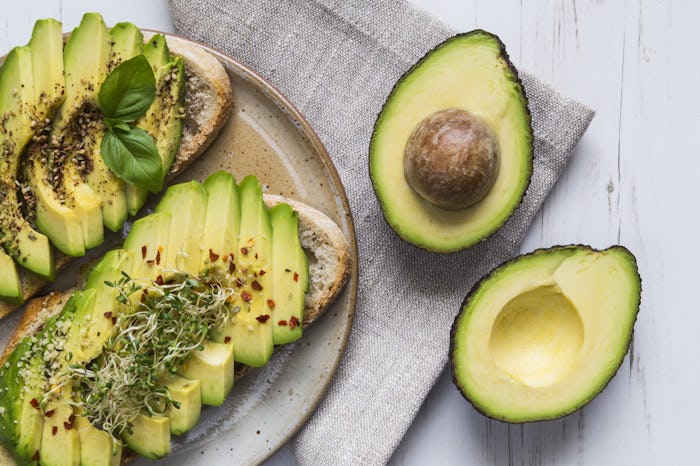When you're trying to conceive (TTC) and it's just not happening, it's easy to feel like you're doing something wrong. It can be soul-crushing to keep seeing negatives when all you really want to do is wave a positive pregnancy test in the air. So what can you do, besides well, just doing it, to speed things along in the baby-making department? It turns out that you may be able to boost your fertility by making a few simple tweaks to your diet. So what are the foods to eat when you're trying to get pregnant?
It may seem a little new age-y but research has shown that if you're TTC, certain foods can help. The "fertility diet" — which includes a healthy intake of vegetables and fruit, whole grains and beans, healthy fats, certain protein-rich foods, and full-fat dairy — can increase ovulation, which in turn increases a woman's chances of getting pregnant, reported USA Today.
When I heard this, my first thought was that the "fertility diet" sounded quite similar to the Mediterranean Diet, which also emphasizes eating plant-based foods such as fruits, vegetables, whole grains, legumes, and nuts, and choosing fish and poultry over red meat. And it turns out that the Mediterranean Diet is also a smart choice for those TTC. "A large study found that the Mediterranean Diet has been shown to improve success rates from IVF so it would stand to reason that it would improve fertility overall," says Dr. Edward Marut of Fertility Centers of Illinois.
If you look at the foods in the "fertility diet" or Mediterranean Diet, the main take-away is that they are balanced, whole foods — unlike trendy, fad diets (pineapple diet, anyone?).
"Whole foods high in essential vitamins, minerals and macronutrients can play an important role in optimizing reproductive capacity," advises Dara Godfrey, the registered dietitian at RMA of New York.
So let's get into 5 super foods to eat when you're TTC, and take note, some of these foods also help boost male fertility, too, so you and your partner can embark on this food journey together.
1Avocado
Yes, there's now even more reason to savor that avocado toast!
"Folic acid helps lay the foundation going into a pregnancy to help prevent neural tube defects. Folate, the food form of folic acid, is abundant in a lot of different foods that we eat, like avocado, as well as in oranges, sunflower seeds, and leafy greens," explains Godfrey.
Folate is one of those nutrients that's beneficial for both female and male fertility. Studies have shown it may improve ovulation, and men who get higher doses of folate make healthier sperm, according to Parents.
2Oysters
Besides being nature's aphrodisiac, oysters are the richest source of zinc, a key nutrient when it comes to procreating, according to Everyday Health, and zinc deficiency can slow the production of good-quality eggs.
Zinc is also something your partner should pay attention to. "Zinc can help increase testosterone levels and also help improve the sperm quality and quantity," advises Godfrey.
So get in the mood with some oysters, and boost your (and your partner's) fertility to boot. However, when you do get preggo, you'll need to nix your oyster habit.
3Full-Fat Dairy
Finally an excuse to splurge on Ben and Jerry's! It turns out that full-fat dairy is actually better for you than skim milk when you're in baby-making mode.
"I stress the importance of going for full-fat dairy. When you get rid of the fat, you get rid of more of the female hormones, the estrogen, and you're left with more of the androgen, the male hormones. There's research done at Harvard to show that there was more fertility success with their patients who ate more full-fat dairy compared to fat-free dairy," explains Godfrey.
In addition to ice cream, consider eating full-fat yogurt with strawberries on top, as the Vitamin C in the berries will actually help the calcium in the yogurt absorb better, recommends Godrey.
4Wild Salmon
When it comes to reproduction, it's all about the omega-3 fatty acids. Wild salmon is a great source of omega-3s, as are other small fish, like sardines and anchovies, and omega-3 enriched eggs. For the vegans, you can get it in walnuts and flax seeds, according to Godfrey.
"Omega-3s can help regulate hormones in the body, increase good quality cervical mucus, and also promote ovulation. I also specifically stress it for my patients who have polycystic ovary syndrome (PCOS) or endometriosis," advises Godfrey.
5Vitamin D
Vitamin D can be found in pastured eggs and butter from grass-fed cows, cod liver oil, organ meats and most notably, the sun, according to Natural Fertility and Wellness.
Godfrey explains, "There's a lot of new research coming out about the benefits of Vitamin D for fertility. It's been linked to better sperm motility. It can also help regulate our blood sugar levels, help with ovulation overall, and there's even some research showing it can help with IVF success rate."
While it can be easy to think that incorporating these foods will be the magic bullet you need to conceive, it's also important to realize that everyone is different.
"While there's not one dietary intervention that will help everyone get pregnant," says Godfrey, "it's all about optimizing that reproductive capacity, and making sure that you are doing everything you can humanly do — that you have control over — to optimize your fertility, and food is one of them."
Check out Romper's new video series, Bearing The Motherload, where disagreeing parents from different sides of an issue sit down with a mediator and talk about how to support (and not judge) each other’s parenting perspectives. New episodes air Mondays on Facebook.
